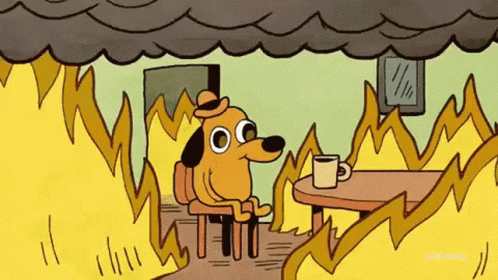Dear Friend,
I thought long and hard about sending this email today. The last couple of years have upped the ante on what it means to say it’s a stressful time right now, but watching the world go through what it is going through right now is truly stressful. I hope you’re doing okay. If you’ve been feeling disoriented, questioning the things you do and struggling to cope, know that you’re not alone. And I hope you find this email useful.
Today, I wanted to talk to you about burnout. I know, I know, it’s like so late 2020 - what next, a recipe for banana bread? But like, hear me out.
Defining Burnout
There were multiple periods of time during the pandemic when I believed I was burned out or going through burnout. It was - and in some ways, continues to be - the flavour of the season. A badge of honour for anyone and everyone with a job. I am working so hard and I am so burned out. It was - and I’ve always wanted to use this word - ubiquitous. As it turned out, what I’d been feeling was some kind of fatigue, but it wasn’t exactly burnout.
The academicians who’ve been researching burnout define burnout to be the combination of 3 very distinct things:
Depersonalization/The perception that whatever you do doesn’t matter or isn’t effective: Ugh, I’m useless.
Physical and emotional exhaustion: Ugh, I can’t or Ugh, I don’t care
Cynicism and negativity: Ugh, I hate my life
Burnout manifests when there is a high frequency of these 3 responses. As it turned out, while I’d been one or the other of these 3 things previously, it was during this last month when all three hit me together. I was living in low battery mode, unable to get off the sofa for the simplest of things, loathing the most basic of interactions and feeling like nothing I’d ever do would matter.
Now, there is a lot of helpful literature on burnout and how we can navigate it. But as I claw my way out of my own burnout, I’ve realized that burnout hasn’t just affected my health and my career, it has also had a significant impact on my finances.
Money and Burnout
I often find myself thinking about money the same way I think about food. The moment there’s stress or any emotional trigger, I find myself losing control with one or the other, or both. I’ve still not been able to find my footing with nutrition, but I have managed to get (somewhat) ahead of my money habits. Here are the lessons I learned the hard way on how burnout affected my finances.
Automate savings:
I invest both actively and passively. So apart from the SIPs that are automatically deducted from my bank account, I also set aside an equal portion of my savings to put into stocks based on my own research and recommendations from investment advisors.
I’d designed it this way because I actually enjoy the process. But when I was burned out, anything and everything that required active participation from my end was ignored. I didn’t care or was too exhausted to give the process the time it deserved. As a result, I just let that portion of my savings go. I didn’t invest. The money that stayed idle in my bank account gave me a false sense of having “more”, triggering unnecessary expenses.
The lesson here was to not have a significant proportion of savings under my active control.
I just increased the number of SIPs I invest in, so that even if I miss out on my “active” part, there’s no significant drop in overall savings.Automate everything, actually:
The other thing about burnout that no one tells you is that you lose track of time in ways you’d never imagined before. I went from being a planner nerd to not knowing what day of the week it was. I missed deadlines, forgot renewals and lost track of my bills. It was a mess. And it could’ve been really expensive for me - by way of late fees and interest - if I hadn’t scrambled on the last date (leaving me even more stressed and exhausted) to get things done.
One way to not miss deadlines to set up autopay in your bank account, or at the very least, set up recurring reminders on your phone.Make spending hard:
Easier said than done, of course. I found myself seeking comfort through retail the same way I sought comfort in food. I slept very poorly during this period, resulting in endless scrolling and unnecessary social media fuelled shopping. At one point, it became an addiction. I also ended up spending a lot on convenience - getting groceries and food delivered. This would’ve been okay if my choices weren’t poor - triggering multiple cycles of buying. It was ridiculous and I ended up stopping only after I logged out of my social profiles (can’t delete the apps cause I work in social media!), deleted billing information and went cold turkey on the apps. Deliberately making spending difficult was probably the hardest thing I had to do because it involved introspection and physical distance from my phone. Going cold turkey works for some of us, gradual decreases for others. But it was more important to introspect and take back some kind of control.
1/10 experience, Do Not Recommend
Burnout is debilitating. Physical exhaustion, mental fatigue and the complete inability to take any kind of coherent decisions were not merely every occurrences but themes. And given the world we’re living in, it’s so easy to fall into the endless spiral of cynicism, negative behaviour and just piss poor mental health.
If you’re battling burnout or just poor mental health in general, know that you’re not alone. Consider talking to someone you trust (this helped me!) and getting help to navigate your way through this. And once you get help, you’ll be back in control in no time.
Take care.
I hope you found this useful. If you think you know someone who might enjoy reading this newsletter, do forward this email to them.






Thank you for this riveting piece.! Have been in a 'burned out' phase and it's a totally loathful state. More power to you.!